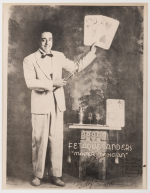Help us get to over 8,755 articles in 2024.
If you know of a magician not listed in MagicPedia, start a New Biography for them. Contact us at magicpediahelp@gmail.com
Fetaque Sanders
| Fetaque Sanders | |
 | |
| Born | May 12, 1915 Nashville, Tennessee |
|---|---|
| Died | June 2, 1992 (age 77) Nashville, Tennessee |
Fetaque Sanders (b.1915-d.1992) toured with the USO during World War II, performing for African American troops in the then-segregated US Armed Forces. After the war, Sanders continued to perform his magic act until 1962.[1]
Biography
Fetaque, pronounced "Fee-take", Sanders began his professional career in 1933 setting out to Chicago for a part in a stage show that would be performed at the World's Fair.
After he finished his classes at Tennessee State in the spring of 1938, he bought a second-hand set of Punch and Judy figures. Designing and building a cabinet for their performance, he developed a variety act including puppetry and impressions of well-known figures (black and white).
In January 1939, Sanders appeared at the Society for the Study of Negro History in Washington, D.C. Finding many opportunities he relocated to the District of Columbia. Sanders married Irene Kennedy, who had been a volunteer from the audience at one of his shows, in 1942. Irene joined her his show as his onstage assistant. The two performed on Broadway in New York City in May 1943 (a gala event directed by Orson Welles).
During World War II, he toured with the USO on a recommendation from John Mulholland, whom he had met at the Magic on Broadway show.
He was featured in a December 1949 Ebony magazine article on black magicians.
In 1958 Sanders suffered a stroke brought on by overwork which impaired his peripheral vision and in 1962 at the age of forty-seven he was forced to retire. He returned to Nashville and became a magic collector.
In March 1983, Sanders was struck by a car while out looking for magic material in second-hand stores. He never fully recovered and spent the last decade of his lite as an invalid. He eventually died of complications from pneumonia.[2]
He was elected into the Society of American Magicians Hall of Fame and Magic Museum.[3]
He was mentor to Samuel Patrick Smith.
Books
- Ten Easy Trix That You Can Do
- Sell Your Act with Posters
- Sell Your Act with Letters
- Secret Magic Words
References
- ↑ of Promotional Broadsides for Fetaque Sanders
- ↑ Conjure Times : Black Magicians in America by Jim Haskins, Kathleen Benson (2001)
- ↑ of Promotional Broadsides for Fetaque Sanders
- The Linking Ring, Vol. 53, No. 6, June 1973, OUR COVER FETAQUE SANDERS by Jim Magus, p. 60
- The Linking Ring, Vol. 64, No. 3, March 1984, A History of Blacks in Magic by Jim Magus, The Imagination Man, page 36
- The Linking Ring, Vol. 64, No. 4, April 1984, A History of Blacks in Magic by Jim Magus (continued), page 43
- M-U-M, Vol. 82, No. 4, SEPTEMBER 1992, BROKEN WANDS FETAQUE SANDERS, page 30
- The Linking Ring, Vol. 72, No. 8, August 1992, BROKEN WAND FETAQUE SANDERS, page 113
- The Linking Ring, Vol. 80, No. 1, January 2000, Fetaque Sanders Gone but Not Forgotten! by Samuel Patrick Smith, page 53